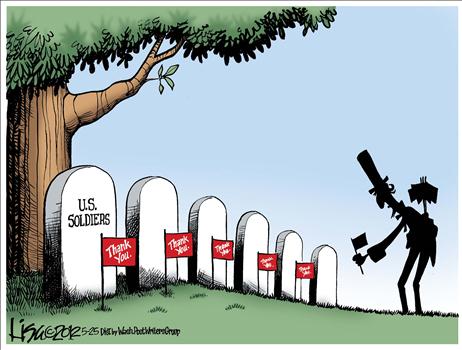 I could have just relaxed today, put up a photo of Memorial Day, and said nothing more. But I thought instead this might be a good opportunity to provide some ponderings on the various wars in which America got involved. Perhaps this is the best way to remember those who sacrificed the most for us all. From the American Revolution to the various manifestations of the War on Terror, here is an abbreviated attempt to offer some thoughts on the goals, meanings, and accomplishments of each major conflict.
I could have just relaxed today, put up a photo of Memorial Day, and said nothing more. But I thought instead this might be a good opportunity to provide some ponderings on the various wars in which America got involved. Perhaps this is the best way to remember those who sacrificed the most for us all. From the American Revolution to the various manifestations of the War on Terror, here is an abbreviated attempt to offer some thoughts on the goals, meanings, and accomplishments of each major conflict.
- The American Revolution. My preferred name for this war is the American War for Continued Self-Government. Why? It’s a more accurate descriptor of what took place. This was no revolution in the ordinary usage of that word. The have-nots did not rise up against the haves. Class conflict played a small role. Rather, the colonists were backed into a corner, witnessing their age-old British rights being violated. They wanted to reestablish those rights, but met with stubborn resistance from the Crown and Parliament. Declared by their king to be in rebellion and fired upon by the King’s troops attempting to remove the colonists’ store of weapons for self-defense, they felt they had no choice but to fight back. The result? They founded a nation based on a combination of Biblical principles and British constitutionalism. That successful “revolution” would serve as an inspiration to many, although most who sought to follow in its wake lacked the Biblical basis for similar success.
- The War of 1812. Another woefully misnamed war, which lasted until 1815. Americans were still being treated as a second-class nation by the British, who hadn’t left their posts in the Northwest as they had promised and who were continuing their policy of stopping American ships and “impressing” sailors into service into the British navy. This war featured a rather disorganized strategy, with too much reliance on militia than the regular army. It showcased some stunning victories at sea against the world’s greatest seapower, a humiliating loss of the nation’s capital, a resounding defense of Baltimore that gave birth to our national anthem, and a final battle at New Orleans that sealed the legitimacy of the Louisiana Purchase in the eyes of the European world. Although there was no declared winner, Americans, by virtue of that final battle, felt very much like they had won indeed.
- The Mexican War. Next to Vietnam, this is the most controversial war in our history. Mexico was not a good neighbor and manifested constant political instability, but it cannot be denied that President Polk had his eyes on more territory from the very beginning of his term. Technically, it began as a border dispute, yet it was the idea of Manifest Destiny that inspired it. The Whig Party deplored it; Congressman Abraham Lincoln disputed Polk’s rationale for the war; the nation was split on its honorable nature. When the fighting ended, America received a vast new territory. Unfortunately, that acquisition led to an attempt to spread slavery in that new territory, to fiery rhetoric on the issue, and eventually to our next war.
- The Civil War. Some prefer another name for this one, whether the War of Southern Rebellion, the War of Northern Aggression, or simply the War Between the States. Even the various preferred names reveal the divide that still haunts us today. While some insist slavery was not the cause, I believe there would have been no war without the existence of slavery. The Civil War was the most devastating of all our wars—700,000 [new estimate] died in the conflict. Over time, I have come to consider Lincoln as one of the greatest of presidents. His perspective on the war, as he tried to see it from God’s point of view, is probably accurate: the Lord allowed it due to the sins of both sides. Although devastating, it did bring an end to slavery and the country eventually united in action. And even though scars remain, we eventually became one people again.
- Spanish-American War. This war began on a false premise—the Spanish blew up our ship in Havana harbor. However, it was the best-informed opinion at the time, and I don’t hold it against McKinley for concluding something had to be done. The Cubans had been calling for us to help them for decades. Next to WWII, this is probably the most altruistic war in American history. The citizenry rallied to free Cuba from Spanish control. It lasted only ten weeks and the goal was achieved. Unforeseen results were the acquisition of Puerto Rico and the Philippines as the Spanish retreated from being an empire. This led to a guerrilla war in the Philippines for a few years, but eventually peace reigned there, the Filipinos received self-government under U.S. supervision, then finally their independence. The American “empire,” if that’s even the proper term, was one of the best in human history.
- World War I. We were very reluctant to get involved in a European war. But when the Germans unleashed unrestricted submarine warfare, sinking more American ships, and when they tried to get Mexico to attack us in a strategy to keep us distracted, we finally declared war. American participation lasted only one and a half years, but the flood of American soldiers to the front turned the tide. The promises made by President Wilson were unfounded—The War to End All Wars—and disillusion with the results led to a strong sense that we should never do this again. Progressives used the war to put the federal government in control of most American businesses. Once the war ended, we reversed that policy, once again pledging we would never do it again.
- World War II. No major controversy here—nearly all Americans agreed we had to respond to the attack at Pearl Harbor. Then when Hitler declared war on us, we had a two-front war without seeking it. The goal was to dismantle the regimes that sought world domination. That goal was achieved. The price was high, with over 400,000 dead. America also emerged from this war as the leader of the Free World, with new and heavy responsibilities. Those responsibilities became more onerous as the Soviet Union set up a rival empire with the stated goal of ushering in the age of universal communism. Our defense of freedom became known as the Cold War.
- The Korean War. This conflict was the first to arise out of the new Cold War. While technically a United Nations action, the U.S. was clearly in command of the strategy, and we provided most of the troops. The Communist North invaded the South; we defended the South and pushed those troops back into the North. It ended with a truce, a stalemate actually, and we still have troops stationed at the border between the two nations. North Korea has become a major threat to stability and has been characterized as one of the Axis of Evil. We were right to defend the South; the decision to return to the status quo rather than win the war remains a source of controversy to this day.
- The Vietnam War. Easily the most divisive war of the twentieth century, we had a reasonable rationale for getting involved: stop the spread of communism in Southeast Asia. Fine goal, but questionable strategy. There are many ways to critique how this war was prosecuted, but suffice to say it led to the demise of the LBJ presidency. When Nixon took over, he eventually ended the active hostilities with a peace agreement, but the decision by Congress to cut off aid to South Vietnam and the problems of Watergate allowed the North to resume the war, this time with success as it overran the South. I consider this the saddest of all American wars. Our loss of life, over 55,000, ended with communism taking over the entire country. Our soldiers were not treated as heroes, as in other wars, and it took far too long for their sacrifices to be honored.
- The Persian Gulf War. I have no problem with this war’s aims: get Saddam Hussein out of Kuwait and corral him so he wouldn’t be a threat to the entire region. The first President Bush cobbled together a coalition of nations that did just that. Yet we didn’t follow through and took on the immense task of overseeing Saddam’s compliance with U.N. resolutions. Iraq became a festering sore that had to be dealt with eventually.
- The War on Terror. Iraq and Afghanistan are the centers of this conflict, but in reality it knows no boundaries. Neither can we know at the present time how winnable this war may be; controversy centers on whether we should be out there prosecuting it or hunkering down behind fortress America. Strategies and tactics are an ongoing debate, but one thing is certain: soldiers are still laying down their lives and should be honored for their commitment. This is a war that must be won; let there be no doubt on that score.
On this day, I honor those who have given their all. As a Christian, I don’t seek war with anyone, but there is nothing Biblical about allowing tyrants, terrorists, and ego-inflated dictators to run roughshod over those who want to live in peace. We have an obligation to defend ourselves and work for the greater good. There will be wars and rumors of wars until the end of this age. While they are being fought, let’s remember those on the front lines.

